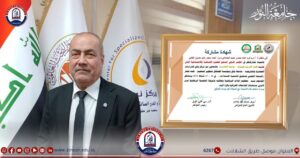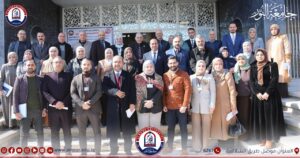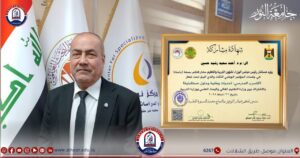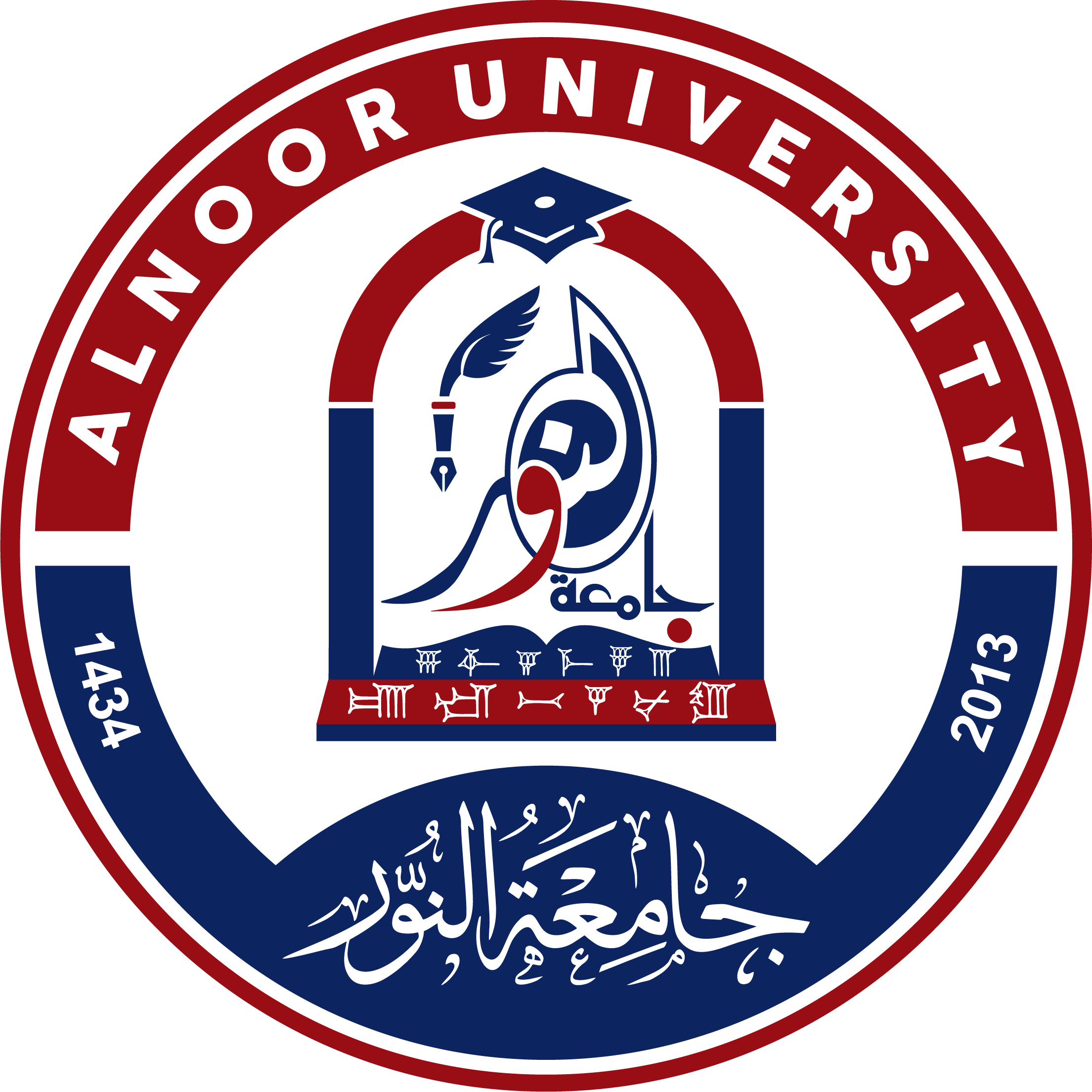Psychological Counseling and Educational Guidance Unit
اPsychological Guidance: This is a field that focuses on addressing the psychological and behavioral issues faced by individuals (university students and staff, including faculty, employees, and workers) and aims to restore their psychological balance to a normal level, whether on a personal, group, educational, or professional scale, for all individuals, both male and female.
The Psychological Guidance and Educational Counseling Division at Alnoor University offers regular assistance to all university students, regardless of their academic levels, including both undergraduate and evening students, as well as faculty, staff, and all workers at Alnoor University.
This division provides the necessary help and support to enable them to overcome psychological, educational, and social challenges. Thus, the Psychological Guidance and Educational Counseling Division at Alnoor University has a goal and a mission to achieve the best results and outcomes, which include:
Every professional field has specific goals aimed at achieving tasks that are easily attainable and have a long-term perspective. Psychological counseling, being a field concerned with helping individuals realize their potential, as well as ensuring psychological and social educational compatibility, offers assistance in overcoming the challenges they face academically, educationally, professionally, and socially. Therefore, the Psychological Counseling and Educational Guidance Division at Alnoor University aims to:
1- Identify the most common psychological and behavioral problems faced by everyone affiliated with the university (students, staff, administrators, and workers) and provide timely assistance through conducting counseling interviews based on scientific principles.
2- The division relies on a work strategy based on two foundations: the psychological and behavioral issues from the perspective of the individuals experiencing them, as they define their problems, and the psychological and behavioral issues from the perspective of the educational counselors assigned in the colleges and departments, as defined by them.
3- Monitor the circumstances affecting university workers that lead to psychological and behavioral disturbances and provide the best suggestions regarding these issues.
4- Promote psychological education among university members to achieve the highest levels of psychological prevention through brochures, psychological posters, and other necessary publications.
5- Familiarize students with the university's academic and civil life in a manner that suits their level, especially for first-year students, while also achieving the social and professional ambitions of fourth-year students and those approaching graduation.
The Psychological Counseling and Educational Guidance Division at the university has a mission to:
1- Provide a psychological outlet for university students and staff to achieve a high level of personal psychological stability within the university community.
2- Foster a spirit of psychological, moral, and professional balance within the university.
3- Direct the attention of students and staff to the existence of an office or site within the university that is capable of addressing the problems they face.
Regarding university students, the division focuses on the following issues:
Educational
2- Psychological
3- Academic performance
4- Ethical
5- Social
6- Behavioral
As for university staff, the division addresses the following issues:
1- Psychological
2- Ethical
3- Performance
4- General interaction
5- Administrative system
1- The staff of the Psychological Counseling and Educational Guidance Division consists of five members, including the head of the division.
2- A central committee at the university level is formed to assign specialists to the Psychological Counseling and Educational Guidance Division.
3- A unified week is organized at the university at the beginning of each academic year, dedicated to psychological counseling and educational guidance. This week is aimed at introducing students to mental health culture and the societal risks of negative phenomena, as well as educating them on university student behavior and student disciplinary regulations through lectures, seminars, and wall posters.
4- It is essential to inform students of the existence of the Psychological Counseling and Educational Guidance Division at both the university and college levels through wall posters, faculty announcements, or the use of electronic display screens to promote mental health awareness and societal risks.
5- A dedicated counseling hour should be included in the schedule, or colleges should be required to allocate time for seminars and lectures organized by the Psychological Counseling and Educational Guidance Division to be delivered to students. These sessions are important to help students face intellectual, ethical, social, and cultural challenges.
The Psychological Counseling and Educational Guidance Division at the university adopts a cluster structure. It appoints a representative in each college, nominated by the college itself, who possesses initiative, follow-through, and a desire to provide psychological assistance. This representative, in turn, selects a nominee for each department within the college. The department nominee becomes responsible for organizing academic advisors for each group of students according to their academic level or type of study, depending on the department’s size and nature.
• The division also assigns one faculty member in each college to represent it, tasked with monitoring the psychological and behavioral issues and the psychological needs of the college's staff.
• The division works on a manual for the academic advisor to guide them in follow-up and field application.
• Monthly counseling hours are scheduled for each college according to fixed, predetermined timetables.
The university's Psychological Counseling and Educational Guidance Division has several key tasks, including:
1- Planning, monitoring, and coordinating all psychological and social activities and programs implemented at the university, whether by the Ministry of Higher Education or any other government or private entity.
2- Organizing awareness seminars on the latest psychological methods in psychotherapy and appropriate and quick problem-solving techniques.
3- Conducting seminars and lectures for faculty members to raise awareness about each stage of student development, including the physical, mental, psychological, social, and educational needs of students at each stage, to better understand their psychological conditions.
4- Preparing an informational booklet for college unit heads, with one version for students and another for faculty and staff, explaining productive work methods.
5- Field visits to colleges to monitor the progress of the counseling work and identify related problems.
6- Establishing an annual database of psychological problems faced by university members, allowing for statistical analysis of the most common student issues, considering academic specialization, gender, social status, and academic levels.
7- Creating a liaison with student discipline committees, investigative boards, and the administrative student affairs team in colleges to understand the causes and nature of issues, as well as the legal methods that either align with or differ from the counseling reforms for students and university staff.
8- Establishing a link with mental health centers and hospitals for psychological and neurological emergencies requiring intervention.
9- Periodically evaluating the activities of unit heads in the colleges and implementing a system of rewards and penalties.
10- Setting up an online consultation platform accessible via a student password.
11- Allocating a space as a psychological clinic and raising awareness among students and staff about a place at the university where psychological, behavioral, and educational assessments and tests can be conducted using prepared and approved forms. These forms are distributed to staff and students to identify the problems they face and determine treatment mechanisms.
12- Assisting new students in adapting and integrating quickly and smoothly into the university environment by introducing them to the division's services and coordinating with student affairs to meet their needs.
13- Developing an annual plan for educational and psychological counseling in the college, with sufficient space allocated for implementing its programs.
14- Appointing a psychological counselor for each academic year and supervising the Psychological Counseling Division in student dormitories.
15- Identifying the most common psychological and behavioral issues among all university members (students, faculty, staff, and workers) and providing prompt assistance through counseling sessions based on scientific principles.
16- Studying psychological and behavioral problems from the perspective of the individuals experiencing the issue and from the viewpoint of the educational counselors assigned to the colleges.
17- Developing individual care and safety plans, with reciprocal development and shared monitoring with the beneficiaries.
18- Monitoring the ongoing development of care plans, paying special attention to preventive psychological measures.
19- Following up on cases handled by various institutions to ensure continuity of service delivery and the success of interventions.
20- Providing individual counseling to students facing minor behavioral, social, educational, or psychological problems, with the aim of preventing the issue from escalating. The counselor will be available in the office to provide individual guidance.
21- Continuously monitoring students' academic performance through course coordinators and department heads to identify academic difficulties.
22- Monitoring repeated absences reported by the registration department and addressing cases of academic difficulties on an individual basis.
21- Offering counseling services to students to help them develop their personalities and acquire essential skills to face problems.
24- Organizing seminars and lectures addressing student issues with preventive and developmental objectives.
25- Utilizing university activities to help students develop their skills and interests, thereby guiding them in making career decisions for their future.
26- Respecting the privacy of students' personal and confidential information shared with the counselor, allowing them the freedom to choose their educational counselor.
27- Assisting students in self-discovery by helping them realize their abilities, readiness, interests, and skills, and understanding the problems they face, regardless of their nature.
28- Helping students understand their material and social environment, including its strengths and limitations, and enabling them to utilize their potential and available resources to set realistic academic goals and plan properly to achieve them.
29- Enhancing students' decision-making abilities.
30- Promoting student well-being by helping and training them to solve their problems independently.
31- Developing students' ability to engage in dialogue, consultation, and expressing opinions freely and responsibly.
32- Empowering students to improve, adapt to unexpected changes, and strive for positive change.
33- Gathering information on students with physical and health problems, documenting them in special records, and coordinating with administrative and educational authorities to help these students adapt to university life.
34- Providing consulting and counseling services to both the administrative and educational bodies on issues related to student behavior in the classroom.




